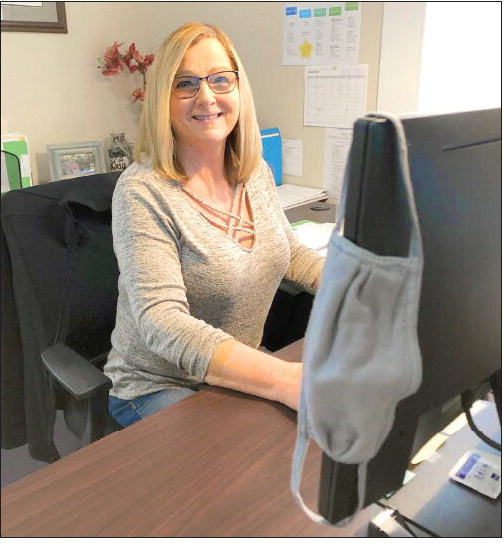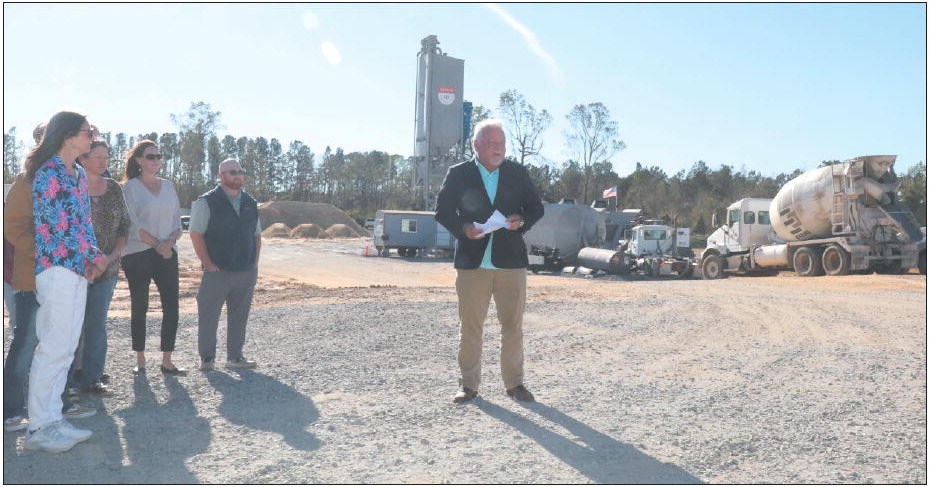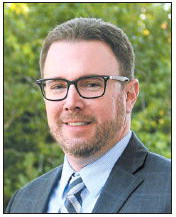Infusion May Have Been a Lifesaver For Jesup Woman with COVID


“I think it might have saved my life,” Holly Thompson said about the infusion she received after testing positive for COVID- 19.
The Jesup resident concluded she was most likely exposed to the virus during a camping trip with friends on New Year’s weekend. By the following Monday, she began to feel ill. Her symptoms included a severe headache, scratchy throat, a dry cough, joint pain and fever. She recognized the warning signs and after she received a call from someone in the camping group that one of them had tested positive for COVID-19, she knew she needed to seek immediate medical attention. Thompson opted to travel to Brunswick, 45 minutes away, because she wanted rapid testing, which was not available in Jesup at that time. Her husband, who drove her to Brunswick, also tested positive for COVID.
Since Thompson was considered high-risk-she suffers from a rare kidney disease, is an insulin-dependent diabetic and sustained a heart attack two months before contracting COVID-19—she was scheduled for a monochronal antibody infusion two days later. Thompson said the infusion was explained to her as a way to try to block the virus from spreading to other organs in her body, especially to her lungs and heart. There is a short period of time to administer the drug for it to be successful. Research has shown the therapy is most effective within 10 days of a positive COVID test. Thompson was fortunate. Many people have missed their opportunities for treatment because of a patchwork system that can decontinued from page
lay testing and diagnosis.
The infusion Thompson received is the same U.S. Food and Drug Administration- authorized treatment that was given to President Donald Trump after he tested positive for COVID-19 last October. The president was given REGN-COV2, one drug in a family of monoclonal antibodies (mABs). These laboratory-made proteins mimic the immune system’s ability to fend off harmful antigens, such as viruses, the FDA explains on its website. Late last year, the FDA authorized the emergency use of two monoclonal antibody pharmaceuticals: bamlanivimab, manufactured by Eli Lilly, and Regeneron’s REGN-COV2 (casirivimab and imdeviab). The drug which Thompson received, bamlanivimab, was authorized for use to treat mild to moderate cases of COVID in adults and pediatric patients (12 years of age or older weighing at least 88 pounds) with direct SARS-COV-2 viral testing and who are at high risk for progressing to severe COVID-19. This includes patients who are 65 years of age or older or who have certain chronic medical conditions. In an article published in The Advance on January 13, local physician Geoff Conner stressed the importance of spreading awareness about the infusions. “Right now, the monoclonal antibody treatment is as important as the vaccine, but it isn’t getting the publicity because everyone is focused on the vaccine.” The vaccine rollout has been dragging, and projections are that people will have to wait weeks or months to receive a dose. For high-risk individuals, time is of the essence. “If he or she contracts the virus and gets a positive COVID test, then their doctor can prescribe the monocolonal antibody treatment, and it may keep them out of the hospital, and it may save their life,” Conner said. He is prescribing the drug for his patients who meet the criteria. After President Trump credited the monoclonal antibody therapy for his rapid recovery, drug makers ramped up supplies, but only a small amount of the product has filtered down to the general public. Hundreds of thousands of vials sit unused while highrisk individuals who could benefit from the drug—for free—are missing a chance to recover more quickly and to avoid hospitalization. It could even mean the difference between living and dying. The U.S. Department of Health reports on its website that mAbs pharmaceuticals are being allocated from the federal level to states, territories and federal entities on a two-week cycle. To date, federal officials have allocated more than 785,000 doses of the two antibody treatments authorized for emergency use during the pandemic, and more than 550,000 doses have been delivered to sites across the nation. The federal government has contracted for nearly 2.5 million doses of the products from drug makers Eli Lilly and Co. and Regeneron Pharmaceuticals at a cost of more than $4.4 billion, writes JoNel Aleccia in an online article published by Kaiser Health News on January 20. But as of mid-January, only about 30% of the available doses have been administrated to patients, the federal Department of Health and Human Services said. The FDA blamed the snag on administration, not availability of the products. Up until last week, there was no nationwide system to inform the public about where they can obtain the drugs which are delivered through IV infusions, according to Aleccia.
Nationwide, nearly 4,000 sites offer the infusion therapies. All states are now required to list on a federal locator map sites that have received the monoclonal antibody products; however, a listing does not guarantee availability to access. Patients are required to confer with a primary caregiver before contacting centers for infusions. (Go to the following web address for information: https://protectpublic. hhs.gov/pages/thera peuticsdistribution/#distri bution-locations) Some health systems are refusing to offer the monoclonal antibody therapies because of doubts about the data used to authorize them. Early studies indicate that Lilly’s therapy reduced the need for hospitalization or emergency treatment in outpatient COVID cases by about 70% while Regeneron’s product reduced this need by 50%. But these studies were small, and there is still doubt about the therapy’s effectiveness.
As more patients are treated, however, there is growing evidence that the therapy is working. Observations from experts at Mayo Clinic in Rochester, Minnesota, and others have spurred federal officials to push for wider use of antibody therapies; in fact, HHS officials have partnered with hospitals in three states that have been hard hit by COVID–California Arizona, and Nevada—to set up infusion centers that are seeing scores of COVID patients every day, Aleccia says in her article.
The infusion takes about an hour to administer, but the total time allocated to patient care is about three hours, including consultation prior to the infusion and a one-hour post-infusion period in which a trained professional watches the patient for adverse reactions to the infusion. There are strict rules on where the infusion can be administered: hospitals, community based infusion centers, clinical spaces like urgent care facilities and “hospitals without walls.” Other protocol is required, including adherence to HIPPA regulations. Also, since the patients receiving the infusions have already tested positive for COVID, they cannot be placed in areas adjacent to non-COVID patients.
After receiving the infusion, Thompson was not out of the woods. Time would tell whether the infusion had been successful in fighting off the virus and keeping her out of the hospital. She was prescribed bed rest, which was not difficult because she was too ill to do anything else, she said. Over time, her headache subsided, as well as the other flu-like symptoms. She entirely lost her senses of smell and taste, and without an appetite, staying nourished was a challenge. But gradually, she regained strength and an appetite.
Three weeks after the onset of the virus, Thompson recovered sufficiently to return to her job as a paralegal at a Jesup law firm. She still tires easily and has to pace herself, but she has fared better than some of the others in her camping group who tested positive for the virus. Thompson’s husband seemed to have had a milder case of COVID- 19, but did develop a troublesome cough which was diagnosed as bronchitis and was treated successfully. Others who had gone camping with the Thompsons that New Year’s weekend had varied outcomes. Two of them developed pneumonia but all of them are now recovering.
Thompson is grateful for the medical personnel who, once they recognized her as high risk, responded promptly. “Before I was tested for COVID, I had never heard about the infusion. The nurse-practitioner at the clinic where I was tested recommended it and I am very glad she did.” Thompson hopes that as more people become aware of the option to receive the monoclonal antibody therapy, perhaps there will be more happy outcomes like hers.





